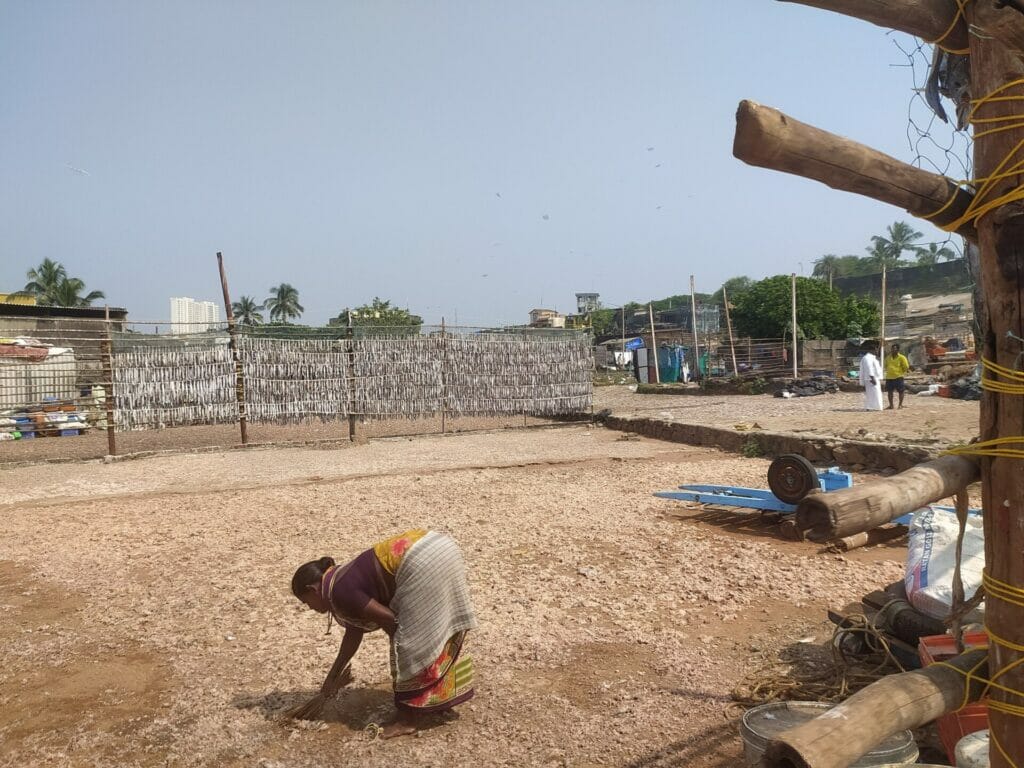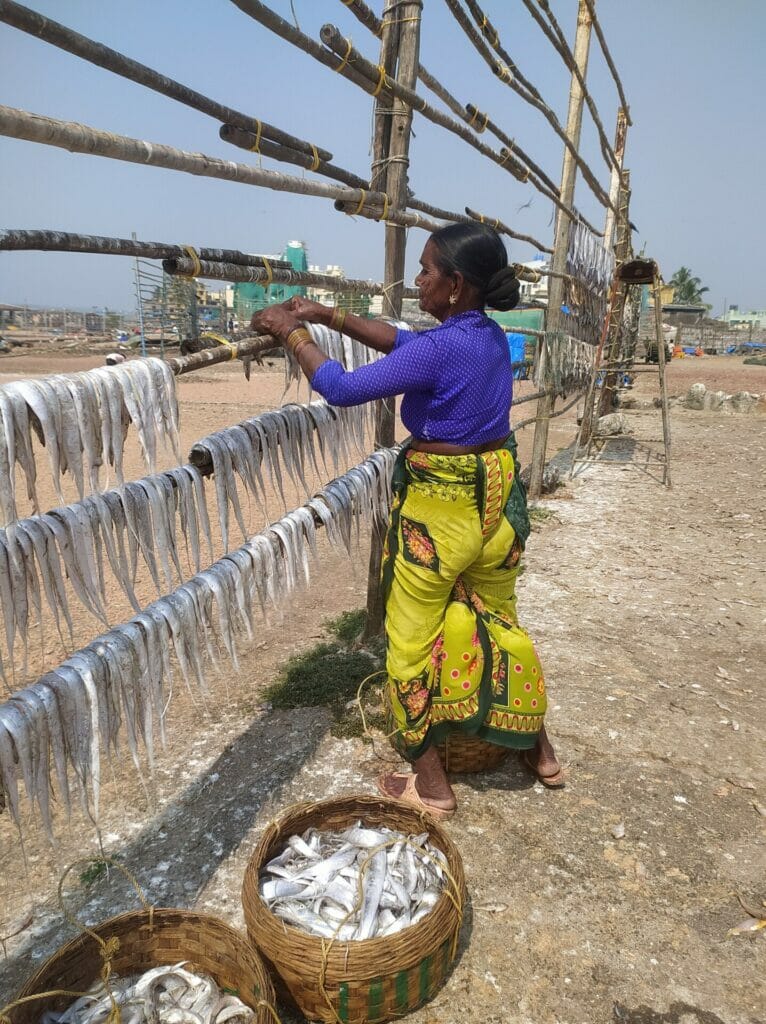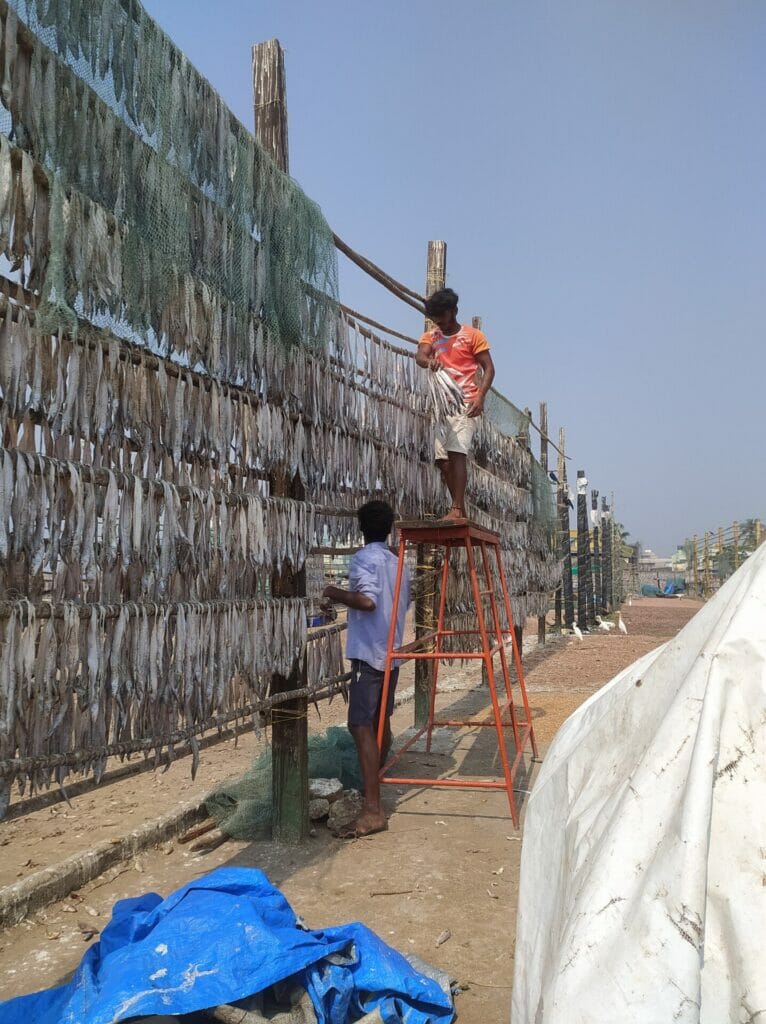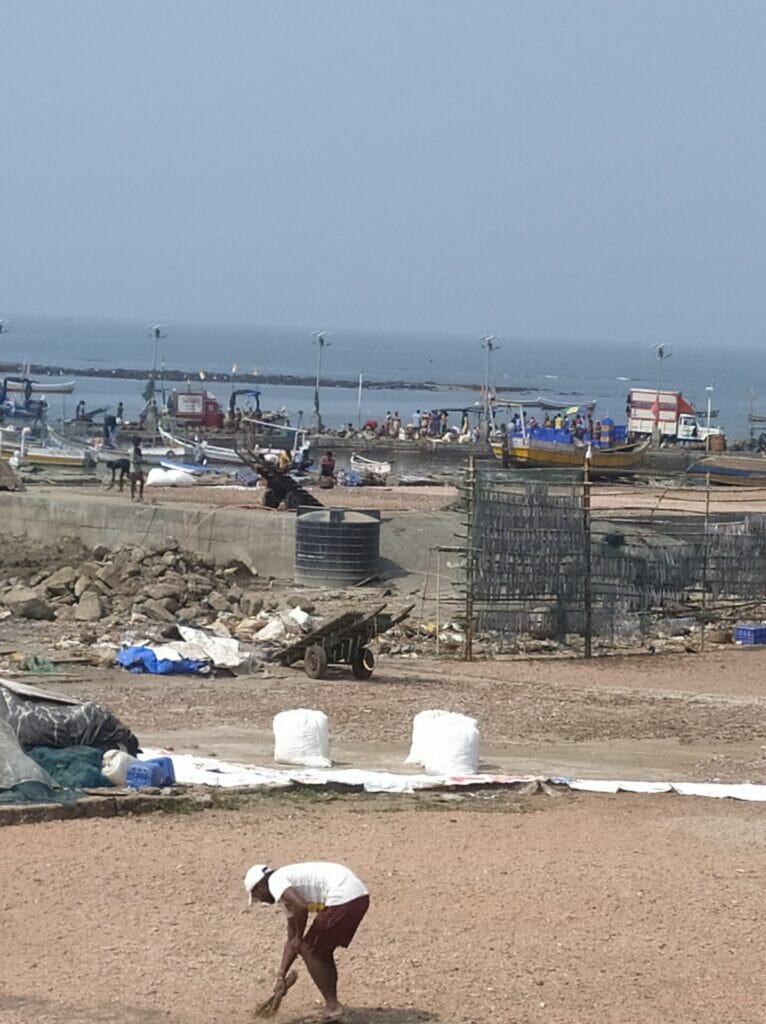Among the many vocations and livelihoods severely impacted by climate change is the dried fish processing sector in Mumbai. Unseasonal rains lashing the coastline directly affect the produce and yield, and ultimately the business itself. The trade, entirely dependent on sunlight for its drying process, has become extremely vulnerable to the unseasonal rains, a direct result of climate change.
At Madh village, between resorts and bungalows lining the coastal backyard, lies a buzzing village trading in dried fish. As soon as a boat lands at the jetty with fresh catch in baskets, the fish are sorted by the women at the jetty.
Read more: Drowning in debt: Mumbai’s fisherfolk struggle to survive extreme weather and dwindling catch
Dried fish varieties continue to be processed the traditional way by putting the fresh catch out for drying under the hot sun either with or without salt. It’s an entirely natural way of storing fish, a source of calcium, for a longer period.
The drying schedule depends on the fish and the temperatures. On hot sunny days, one day under the sun is good enough for the shrimps and prawns to dry. However, fishes like bombay duck and mackerel need more days to dry, explain fisherwomen involved in the trade.
Traditionally, gender roles are neatly divided in the fishing business. While the men of the family sail on boats to catch fishes, the women handle the selling and processing part of the trade. While the best catch is sold off at the market after lacing with ice, the rest are put out for drying on bamboo stilts. The fish waste is dried on the ground and sold to the fishmeal industry for making powder served as feed for poultry and aquaculture. Fishes also tend to be diverted for drying when market prices for fresh fishes are low.

Impact of unseasonal rain on dry fish
In the past few years, the rainy season has been longer, increasing losses for the fishing community. It doesn’t have to be a storm or cyclone to cause damage to the dried fish. Even a hazy, gloomy day can disrupt their drying schedule. Light drizzles spoil the output and can potentially destroy the yield. Unpredictable weather conditions due to climate change mean that those involved in the dried fish work, are never sure if their yield will be safe.
“Since the past few years, the monsoons have extended beyond its stipulated time. It upsets the drying schedule. The dried fish sector is more vulnerable because regular off-season rains can spoil the catch put out for drying. Sudden cyclones like Taktue make the business quite unreliable,” says Rajhans Tapke, president of the Maharashtra chapter of the National Association of Fishermen.
The fisherwomen say that when it rains, the entire stock gets spoiled. Since the quantity put up for drying is huge, the fish cannot be retrieved in case of sudden unseasonal rains. Most of the fishes are put up on bamboo stilts, at a height of about 12 feet accessed only by tall stools. Also, since they do not have storage space, even if the fishes are retrieved, there is no space for the dried fish stock to be kept safely. The shrimps strewn out for drying on the vast drying pitches are the worst affected. They are left with no option but to bear the loss.
“When the fish laid out for drying gets wet in the rain, the stench is unbearable and soon worms get in all over it. There is no option but to dump it back into the sea,” says Jayantri Prasad, 40, who hails from Sultanpur, Uttar Pradesh and works as a labourer.
India is the world’s third largest fish producer globally and 17% of the catch is used for drying, according to a study by Dakshin Foundation, a NGO that is researching the dried fish sector as part of natural resources management of the coastal ecosystem.

Climate change has impacted most of the coastal fishing villages lining the Arabian coastline in Mumbai from Versova to Madh village, Manori and even extending to Uttan and beyond in the Raigad region. Its impact is evident in the fishing village at Madh, which has a huge dry fish drying business.
How rains impact their unique business model
In the dried fish business, the workers are hired and paid for the entire fishing season that lasts for the eight non-monsoon months. The fishing season in Mumbai commences post-monsoons with the Narali Purnima festival that roughly falls around India’s Independence Day on August 15 and winds up by May 30th the following year.
Since this business is a labour-intensive sector that requires long hours of working under the hot sun, only specialised labourers work in these fields. They hail mainly from villages in Uttar Pradesh and Telangana. “Once here, we have to take care of every expense from food, medication for the entire season. These expenses and payments have to be done for the entire season irrespective of the rains or losses,” says Rupina Koli, who is involved in the dried fish business.
She recalls how things got bad during the Tauktae cyclone that lashed the Mumbai coast on May 18th, 2021. People lost their stocks and had to take debts to pay off the workers since it was the end of the fishing season.
“It’s a vicious cycle. When the weather gets rough, the boats don’t go fishing resulting in low output. The low supply of dried fish in the market causes a hike in prices. However, since customers cannot afford to buy fish beyond a particular range, they tend to buy less or even stay away from the market. We suffer both ways. We can’t raise prices beyond a point since we won’t get buyers,” explains Ashwini Sandhyacha from Versova village, a vendor at the Marol wholesale dried fish market.

Read more: Winds of change in Mumbai’s fish economy: No, the pandemic isn’t only to blame
Response of the government
The demand for the government to study the impact of climate change and find solutions is increasing by the day. Those dependent on this business are also demanding compensation for the losses due to storms; similar to the aid granted to farmers.
The government must look into the losses of about 10,000 families that are involved in this dry fish trade in the Mumbai Metropolitan region and compensate them, says Tapke.
Some fishermen did receive compensation to the tune of about Rs 10,000 after the Tauktae cyclone in 2021, but that serves no purpose, says Rupina Koli, explaining that the fishing net itself costs over a lakh rupees. “Even sending a boat out in the seas for fishing could cost about Rs 50,000 at times because of the high cost of diesel and labour involved. We do receive subsidised diesel from the government but the reimbursements come very late,” says Rupina.
“Despite repeated petitions, the government has failed to respond to our plea for aid. Now it seems pointless to petition them for aid. While the government is generally sympathetic towards the farmers’ plight, each time weather plays truant on their crops, our pleas get ignored and fail to get us relief or compensation for loss of our yield,” sighs Manda Koli from Madh Village, who is involved in the dried fish business.
Those involved in the dried fish business are demanding that the government compensates them for the onslaught of climate change in the same way that they grant aid to the farmers.
“Despite repeated petitions, the government has failed to respond to our plea for aid. Now it seems pointless to even petition them for aid. The farmers manage to garner sympathy each time the weather plays difficult, while we suffer because we don’t manage to highlight our plight enough,” sighs Manda Koli from Madh Village, who is involved in the dried fish business.

Hard times in harsh weather
Working in the dried fish sector also affects the health of most of the fisherwomen, since they spend long hours under the hot sun, with almost no cover. “At times, we get shivers at night due to the drastic change in temperatures from extreme afternoon heat in the sun. Constantly handling wet fishes makes our fingers numb and our legs ache,” says Rupina Koli.
Not surprisingly, almost all the fisherwomen or Nakhvin, as they are known, said that they wouldn’t want their next generation to enter this profession. “It is increasingly getting unaffordable to send a boat out in the waters for fishing. Most in my Versova fishing village have already sold off their boats and the next generation has moved on to other professions. Fishing is no longer worth it,” says Shilpa Darshan Kathin.
“The profit margins are very low these days. The fishing community is forced to accept the losses and move on. Many fisherwomen are forced to pawn or sell their jewellery funds to recover from the losses caused due to the erratic climate and other factors. The financial distress may not be evident on the face of it, but this is the reality on the ground,” says Rajshree Bhanji, president of the Marol Market Fish Sellers Koli Women’s Organisation, advocating for the rights of the fisherwomen involved in the dried fish trade.
Anu Koli, currently in her 60s, puts it succinctly, “Our lives have dried up under the sun like the fish put up here.”